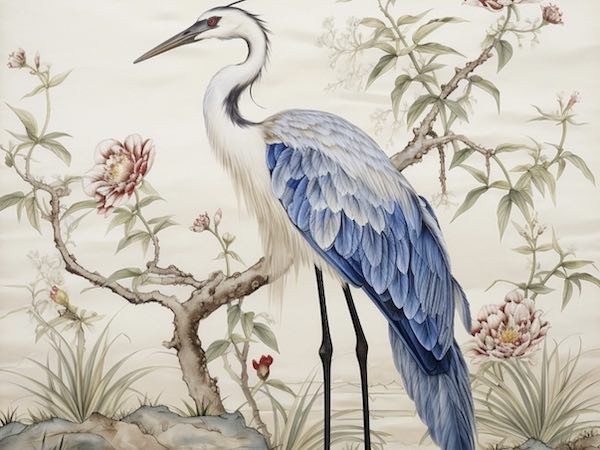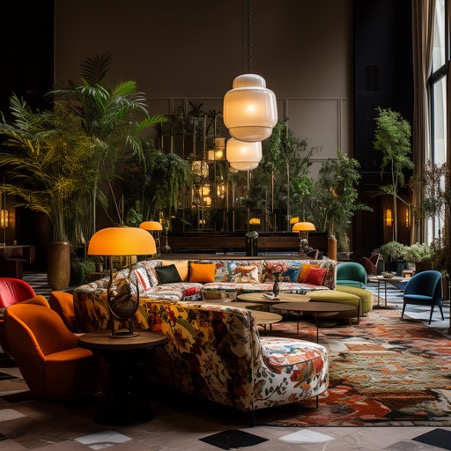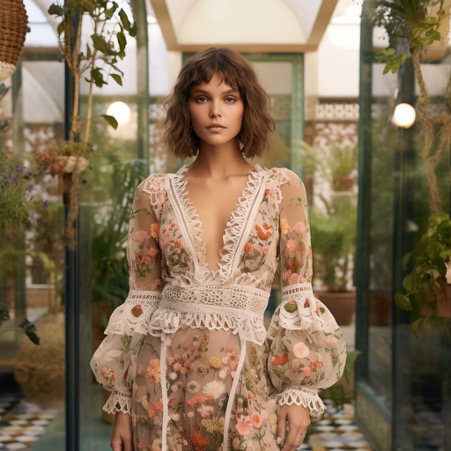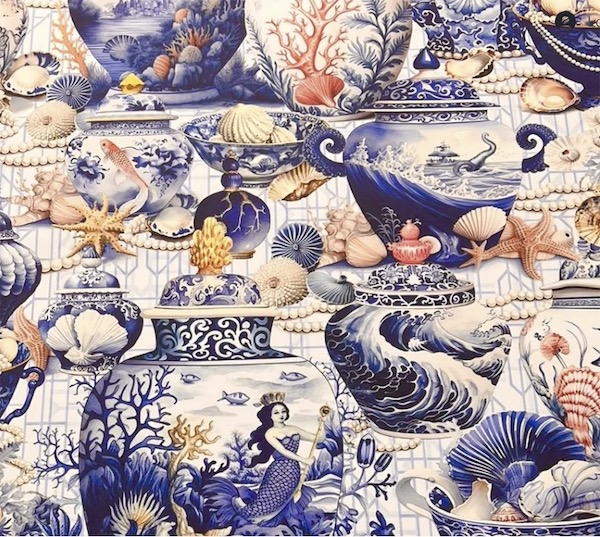
(Image courtesy Print Pattern Archive. AI-generated image.)
By Cheryl O’Meara, Print Pattern Archive
(Read Cary Sherburne’s AI explainer articles here and here.)
In this article, I delve into the impact of AI as it infiltrates the industry. I look at the joys and ramifications for designers and directors alike and the urgency of staying well-informed.
Unless you’ve been seriously napping on trends, you would have seen the headlines and discussions on AI and what it means for the human race. I don’t exaggerate when I say we are about to enter a new paradigm and it starts now.
Every industry will be disrupted, and life as we know it will slowly change unimaginably. Quantum computers are in development that are infinitely more powerful and can process broad datasets, solving complex problems that join the dots with what used to be silos of knowledge.
“[AI is] the most profound technology that humanity will ever develop and work on. [It is even more profound than] fire or electricity or the Internet.” —Sundar Pichai, Google CEO
The impact on the industry, employment, and processes will be disruptive. Ever the optimist, I believe this is a positive time to embrace new technology and go with the flow. As businesses, it’s so important to keep informed, flexible, and reactive with this fast-moving picture.
“In the midst of chaos, there is also opportunity.” —Sun-Tzu
Creating with Generative AI
For those of you who are new to generative AI, get yourself on Midjourney or Stable Diffusion and have a play. Your mind will be blown after inputting a few prompts (keywords) and before your eyes, images are generated in seconds that would have taken you hours to paint or create. See below my Japanese woodblock floral prompt.
With a few words, you can create interior shots that look like a bougie bond scene without even picking up a camera (see below). The creative world is your oyster with AI as your co-pilot.
“…like liquid imagination flowing around the room” —David Holz, founder of MidJourney

(Image courtesy Print Pattern Archive. AI-generated image.)
So What Does This New AI Co-Pilot Mean for Design?
Well, we’re about to get a massive upgrade. As limitless possibilities become available to everyone, it gives a more level platform. Design will become more about ideas, concepts, and IP.
How Print Pattern Archive Uses AI
For inspiration, its next level, see the image below. Some of our prompts have blown our minds and pushed our creative possibilities to new levels, as seen in this image.

(Image courtesy Print Pattern Archive. AI-generated image.)
Using AI inspiration, my incredibly talented co-director Kerri Rigby can take the inspiration, have it whipped into shape with embellishment design, and translated into a garment in no time at all. She has industry experience of designing over 4,000 garments, so her technical knowledge and manufacturing experience allow her to edit and select with optimum commercial output, accelerating these ideas and making them exist in all their beauty. Though it sounds simple, you have to have a good commercial and creative eye. A quick look on Midjourney and you will see infinite “newbie” channels filled with gaming type fantasy images or Donald Trump as a pizza.
Often it will generate a beautiful bird, but it will have three legs or something a bit odd. It’s certainly powerful but also in its infancy. Good “prompt engineers” are in demand, and in some industries are now commanding six-figure salaries.
There is a real skill in getting results that don’t look AI.
The Race for Perfection
I’ve talked about my print algorithms before, and I can now spot AI images flooding into the media and design. Have you seen them, too? In some ways, they are too perfect.
I predict that within two years, designers will have perfection at their fingertips. But then what? Then it becomes about ideas, IP, and a different form of creativity. Probably, but for me, there’s something a little cold about perfection. Generative AI is absolutely here to stay and no doubt in time will become much more sophisticated.
But Do We Want Perfection?
I’ve talked previously about my love of “analog” paint marks in the antique artwork in our archive. How amazing it is to see the touch of a paintbrush in artwork painted 150 years ago.
How you can feel the process and the soul in the legacy of that artist. There’s something precious about it. If I create a hand-painted piece today, will a designer looking at it 100 years in the future feel that?
I watch Kerri and the designers painting and laughing and having fun experimenting and creating artwork on studio days, creating batiks, an ancient technique with unexpected results! I see the undulating line and I can feel the fun and creativity. Though it’s not perfect, it has a human touch and something captivating and beautiful. I feel this is something important to remember in the rush for perfection.
I believe that blending human processes with digital are the magical ingredients for the future of design.
Design Case Study
Early this year, I started a powerful collaboration with Siobhan Murphy of Interior Curve and the BBC show Interior Design Masters.
Siobhan approached us wanting to develop a range of wallpapers using archive pieces and generative AI.
We uncovered a remarkable synergy. Armed with Siobhan’s design vision and my 30 years design experience working with iconic brands from Alexander McQueen to Soho House, we found ourselves co-creating the most exceptional pieces.
A fascinating blend of archive treasures, handcrafted elements, and AI-generated imagery. See here our magical Secrets of the Ginger Jars wallpaper detail.
For me, it was an internal paradigm shift. We excitedly generated hundreds of images together that we edited, selected, reworked, and infused into the design process. I realized I had tapped into a new internal well of creativity: storytelling.

(Image courtesy Print Pattern Archive. AI-generated image.)
I found myself going deep into my imagination and design references of everything from Japanese mythical creatures to conjuring seaweed and ocean life. I used my vast glossary of design terms and techniques from a life of creativity. I found it so immersive, fun, fantastical, and deeply imaginative, the design possibilities were limitless. For Siobhan, working with AI brought about a shift in skill sets, adding an extra layer of creativity to the process. It rapidly breathed life into her vision, allowing more time for meticulous refinement with color and placement.
The technical execution needed from me was there, the half-step repeat, and critical design balance. While designing, we felt the end consumer, their story, and their interior was in mind all the way through. Siobhan’s strong brand handwriting led the narrative.
The results were incredible; it was like nothing I had ever designed before. There were many screams and squeals of excitement that day in the studio! I really believe that those designs you put your heart and true creative soul into really shine with alchemy.
I have to say, it was so new that I had no schema to put the collection into. The results were confirmed this week when the first samples came off the production line at John Mark, the production team exclaiming they were so incredible. They “hadn’t seen anything like it.” Looks like Siobhan’s are about to disrupt the wallpaper industry!
AI and Exclusivity
How do businesses harness the power of AI but mitigate risk? The legalities of generative AI are an important consideration and a gray area when it comes to copyright. It might seem odd that a studio like ours, so rooted in tradition, can be embracing such innovation. Actually, there are a lot of crossovers in the way we work.
From a legal and copyright perspective, we have been treating AI the same way we do antique artwork: Lifting elements and using them as inspiration, but creating something new and guaranteeing exclusivity.
Designers might not stop to think where images are generated from. Generative AI platforms are trained on data lakes and question snippets—billions of parameters that are constructed by software processing huge archives of images and text. This comes with IP issues, and many legal issues are still being worked out. Does copyright, patent, trademark infringement apply to AI creations if they are a derivative work? This is a fast-moving, uncertain landscape, so you’d better play it safe.
One of our clients recently purchased a beautiful print without initially realizing it was AI generated. This threw up all sorts of questions. Is it exclusive? Is something that takes 20 seconds to generate worth £450? How much of the creativity is with the designer and how much is AI? There is a suggestion that AI artworks should come with the prompt terms, but from a designer’s perspective, does that expose their creative process, like giving the ingredients of a secret recipe away?
At this current point in the AI journey, my solution for brands purchasing artwork is to ask the AI question before purchasing anything.
Add a clause to freelancer and copyright contracts that assign exclusivity with the guarantee or origin of generative AI sources. For print studios, do the same with their designers so they know what they’re selling. I would also encourage you to immerse yourself in AI to understand it fully and the legal differences in the generative platforms.
Further down the line, there is opportunity for brands and studios to build portfolios of their own brand handwriting, by training their own generative AI platforms whether it be print, fashion, or interiors, to produce authorized digital assets or goods that can create instant revenue streams or incredible business resources.
The Future
In conclusion, as we step into a new design paradigm, change is undoubtedly on the horizon, and the journey might be a bit bumpy.
I thrive on change and embrace challenges, enjoying the role of a reactive “ninja” in business. However, I understand that some people don’t share this enthusiasm, and for larger brands, steering their ship toward change might be a slower process.
For Print Pattern Archive, history is our muse; and though we are fully embracing AI, we stay connected to our roots in traditional techniques and human processes to keep the soul alive in our work. Client integrity is part of our DNA and we guarantee our sources and design exclusivity whether it’s hand painting or generative AI. I encourage other studios to do the same.














